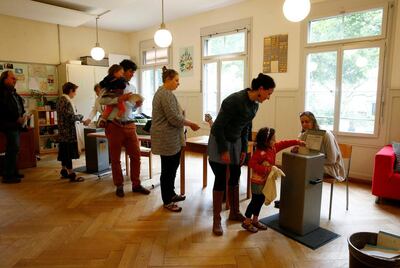In the same week that saw four working single mothers win a High Court challenge over the UK government’s universal credit scheme, Work and Pensions Secretary Amber Rudd announced a raft of changes to the much-maligned system. In a speech, Ms Rudd took ownership of the flagship programme – which seeks to replace six welfare benefits available to working-age people in Britain and merge them into one payment – by conceding many of the system’s failings and slowing its wider rollout to more than three million claimants. The move to this new system, ostensibly brought in to cut the UK’s welfare bill, has been widely criticised for payment delays and reducing the household income of some of the poorest members of society.
Britain’s experience of trying to reform its complex welfare system highlights the challenge faced by countries globally in providing a safety net for citizens. But to me, the UK’s approach shows the inadequacy of simply tinkering with a flawed and broken system that barely alleviates extreme poverty. What is needed, instead, is a complete rethink of the nature and purpose of welfare in the 21st century.
Many engaged in this debate have gravitated towards a superficially attractive alternative in recent years – universal basic income, or UBI. Under this model, all citizens of a country would receive a flat payment instead of welfare, designed to cover the basic cost of living.
Free money? Let’s face it, most of us wouldn’t say no. Just think of everything you’d be able to set your mind to if you were liberated from having to provide a basic standard of living from your toil. You could top up your income with work, without worrying about how you’ll afford the mundane costs – food, bills and suchlike – of simply existing. You could really live.
UBI’s advocates include some of the most influential people on the planet, including Tesla’s chief executive Elon Musk, Virgin boss Sir Richard Branson and Facebook founder Mark Zuckerberg.
But how practical is it in reality? And are there any other alternatives that might provide a more sustainable way of renewing the social contract in an age when technology and automation are making working lives more precarious everywhere?

Countries will have different starting points when thinking about this long-term problem. Finland, for instance – often cited as a highly prosperous nation following a Nordic model of high taxes and high social welfare – has already gone ahead with a trial of UBI. For the past two years, it's been paying a monthly fee of €560 ($688) to 2,000 randomly selected unemployed people with no condition that they seek a job.
The trial has now ended and the results carry lessons for other countries. The general reaction has been one of disappointment as giving people a basic income made them happier but did not encourage them to seek work. UBI purists have argued that the relatively low sum given to those involved means Finland's basic income scheme hasn't been a fair test and is simply a different way of providing unemployment benefit.
But there is an argument that rather than providing benefits to individuals, offering public, enhanced services that meet their personal needs and those of wider society could be more helpful.

Services, after all, provide an economy of scale. It’s simply more efficient to provide things like healthcare and education on a population-wide basis rather than expecting individual citizens to pick up the bills, paving the way for inequalities of access and outcomes. This is demonstrated by the fact that the US, with its private insurance-based healthcare model, nevertheless spends by far the highest proportion of GDP (about 18 per cent) on healthcare in the world, despite achieving relatively poor health outcomes on average. It’s a model that sees government picking up the pieces when an unfair system goes wrong and paying over the odds when it does. By contrast, most European countries spend far less on health but provide better access to their citizens and deliver better outcomes. In the UK, for instance, spending on the National Health Service accounts for less than 7 per cent of GDP and yet UK life expectancy is nearly two years longer than the US, according to the World Health Organisation.
Improving public services is a way of investing in the human and productive assets of a society. Without such investment, inclusive prosperity will forever be a chimera. Just giving people money increases their monthly income but does nothing to improve their capacities and capabilities. It’s individualistic rather than strengthening collective life and what we share.
This principle of efficiency and fair access lies at the heart of a proposal put forward by University College London's Institute for Global Prosperity, of which I am director. Working with a group of respected economists, we've proposed an alternative model for meeting the challenges proponents of UBI are also trying to address. We've called this idea universal basic services (UBS).
So far, we’ve only modelled how UBS could be implemented in the UK but we believe it could be applicable in other contexts too. One of the reasons for choosing the UK as an example is that we already have some key services delivered centrally from taxation. The most notable of these is the NHS. While not without its problems, the NHS is a widely cherished institution in Britain, providing free healthcare to all at the point of need.
So our starting point has been: what if we could apply that same principle to other areas? Our model includes providing free accommodation via a big expansion of public housing, free public transport, provision of broadband and smartphones (in recognition of the critical importance of digital technologies in the modern world) and free food to tackle the undernourishment that some people – even in a wealthy country like the UK – still face.
We believe this could have a transformative effect on society and the economy, by equipping people with the essential building blocks they need as the foundation for a prosperous life. Focusing on a more comprehensive provision of services rather than giving cash handouts also means there remains a strong incentive on citizens to work. In fact, enabling people to move around more easily and access the internet – without the daily threat of hunger or worrying about whether you can afford the rent – together with better skills training and education, would give people more employment options. And by effectively freeing up people’s spending power (by about £500 ($700) per month for the poorest), it would provide an enormous economic boost.
UBS would also address the biggest flaw of all in UBI: the cost. We’ve shown that even a very modest UBI payment to every UK adult (the equivalent of around £300 ($400) per month) would cost the equivalent of 31 per cent of all current government spending. This is simply massive and the temptation for governments would be to slash public services when times got tough. In contrast, the UBS measures outlined above would cost only around 5 per cent of public spending, or 2.3 per cent of GDP, and could be made revenue-neutral with some small tweaks to the taxation system. So extending the social safety net we already have is a far more efficient way of building a society and economy that will be resilient to the economic changes that lie ahead.
That’s not to say that UBI has no place. Indeed, we have come up with a model that also provides citizens with a modest cash payment. But we strongly believe that shared public services provide the most cost-effective way of removing the fear and uncertainty that come from low wages, insecure work and scarce housing.
It’s time to move the conversation on from benefits and from UBI. The problems it seeks to address won’t go away but we need to get a lot smarter about how we tackle them. If long-term prosperity for everyone in our societies is the goal, UBS offers hope of an achievable, affordable solution.
Professor Henrietta Moore is the director of University College London's Institute for Global Prosperity


